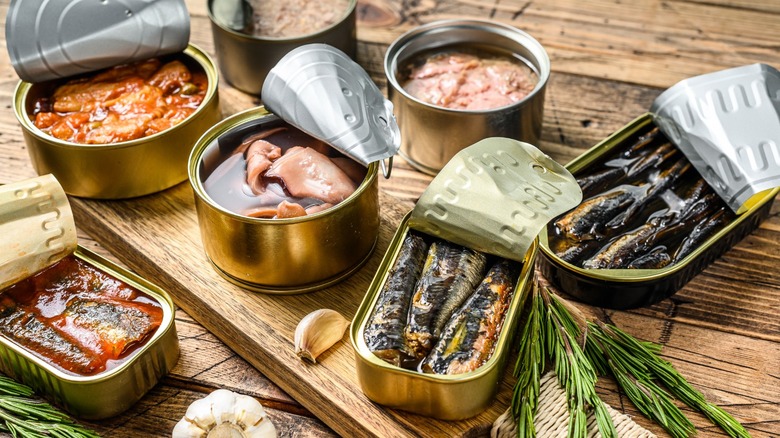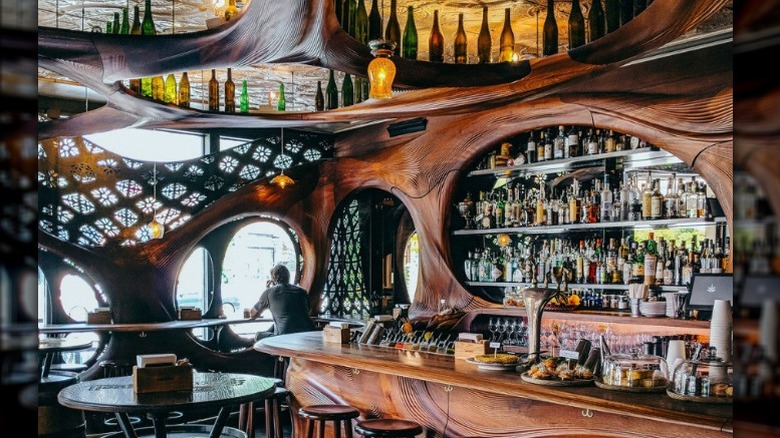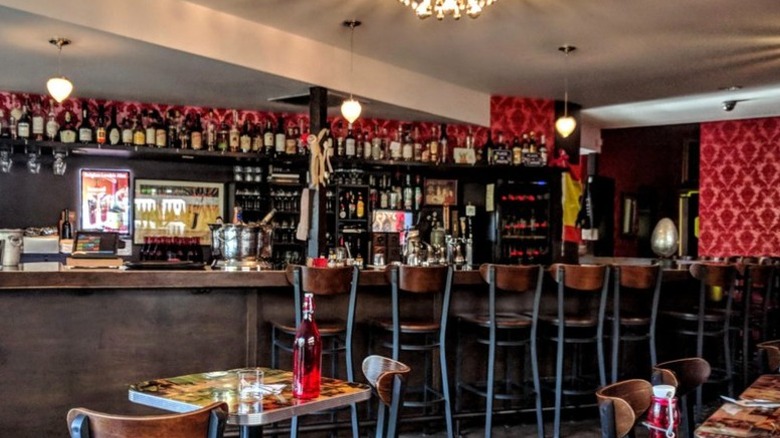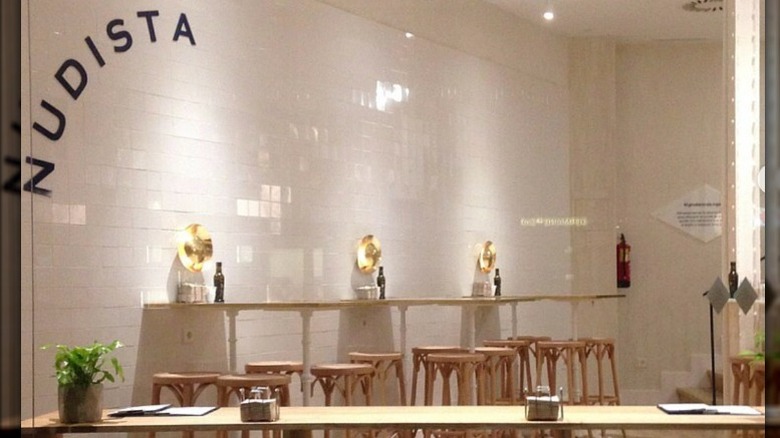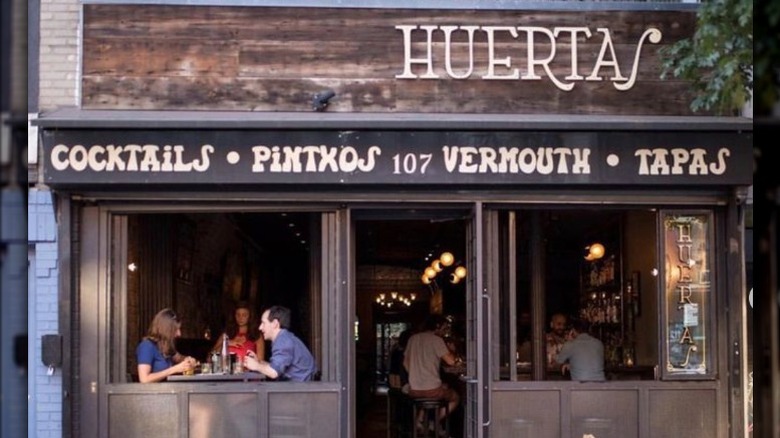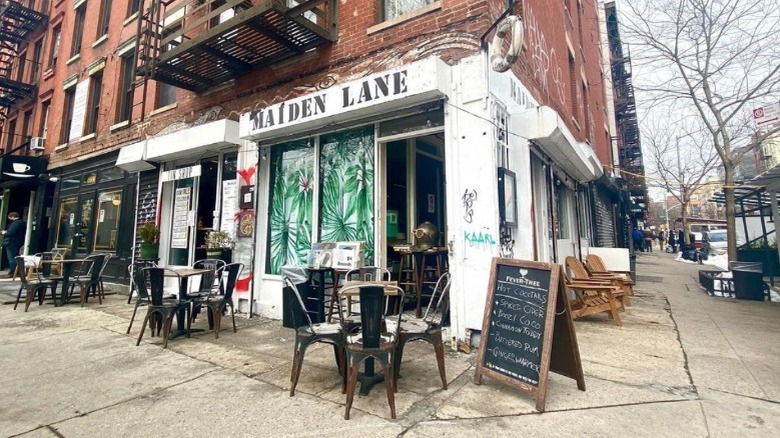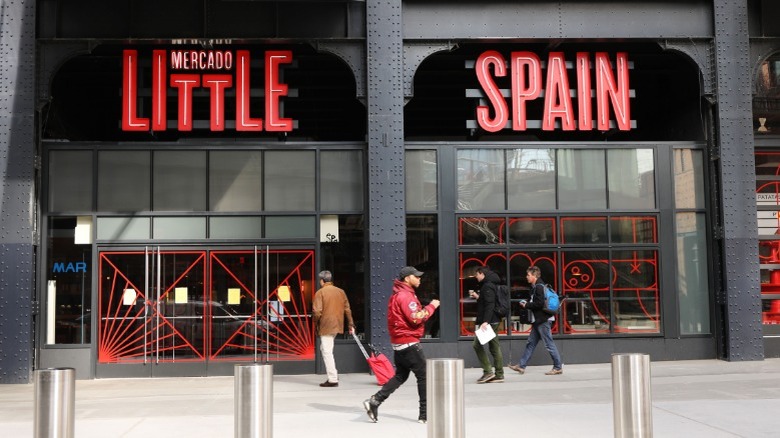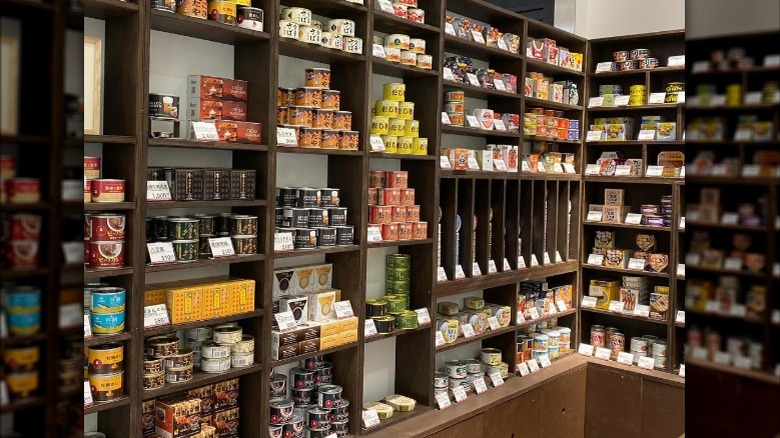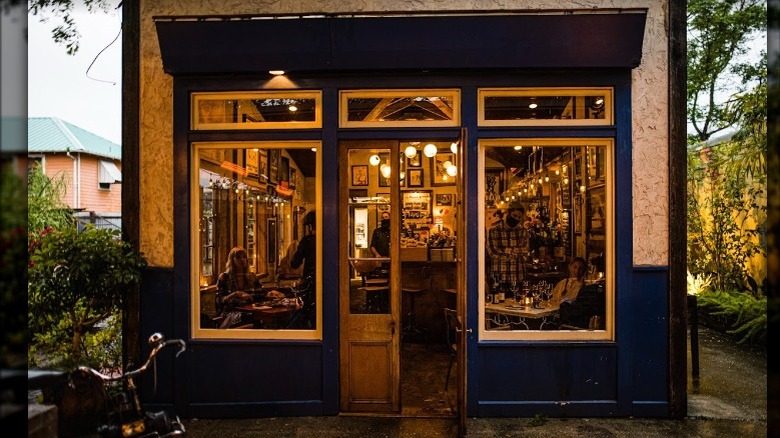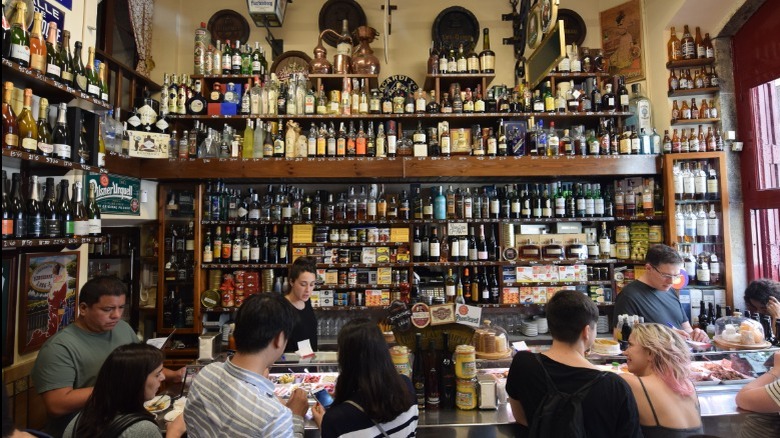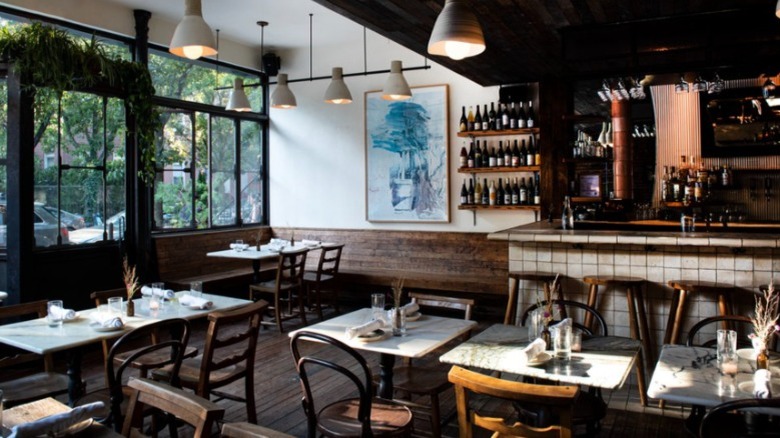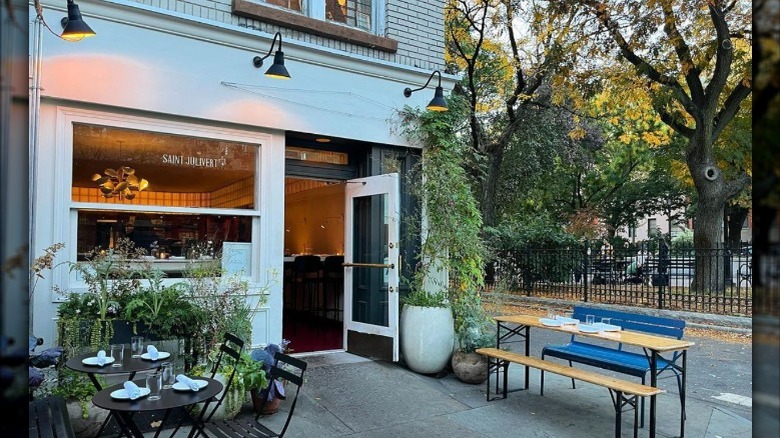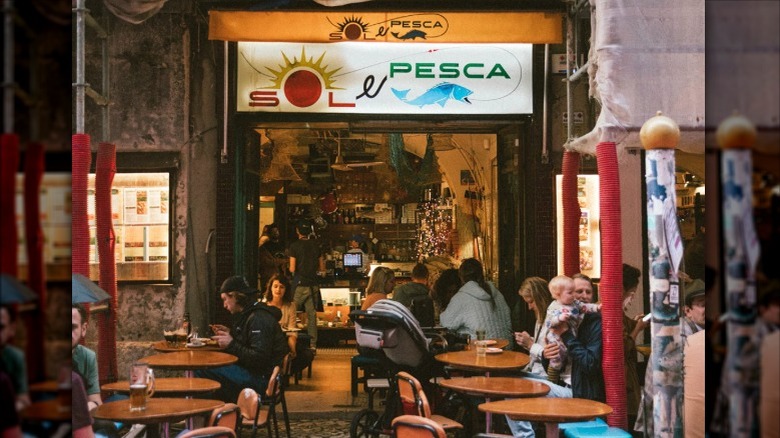13 Restaurants Around The World That Specialize In Canned Foods
Don't despair about the state of humanity just yet. Canned food is having a renaissance of sorts. And while the words "canned food" might bring to mind emergency rations, cold cranberry jelly, or a lackluster tuna sandwich, push all that out of your mind and imagine something much better. Europe and parts of Asia, in particular, make tinned foods into an art form. Preserved seafood is an especially prized commodity; everything is hand-packed the day after it has been caught. Not only that, everything is preserved in omega-3-rich oils and high-quality flavorings just adding to the appeal. Finally, trendy restaurants in the U.S. are starting to carry and served tinned fish, too.
These tinned foods are most likely to be food in restaurants and bars serving small plates, or what you might think of as tapas or pintxos. While a tapa (one tapas dish) is generally just a smaller version of something that could be served as a meal, like patatas bravas, a pinxto is usually identifiable by the toothpick piercing it. Pinxtos, from the Basque country, are often served with a delicious bread base and are just the right size to eat in one or two bites so they're not usually shared, while tapas can be.
Bar Raval in Toronto
The only Canadian entry on the list, Toronto's Bar Raval is a perfect example of Spanish-style conservas (tinned seafood) existing, and thriving, away from home. Bar Raval opened in 2015 and, from the photos on the restaurant's Instagram account, it's also one of the best-looking entries on this list. Full of gorgeous swooping curves and carved wood, the interior of the venue immediately calls to mind Gaudi's architecture and Dali's melting ... well, everything, making the whole experience seem that much more authentic. With a fairly casual atmosphere, the small space offers mostly standing room only, much like a typical tapas bar. Patrons are encouraged to gather around a table and graze until they've run out of things to try.
With a smaller space than some other tinned fish establishments, Bar Raval still serves up all kinds of seafood delicacies alongside perfectly matched accompaniments. The online menu includes squid in ink, Galacian scallops, razor clams, and boquarones (unsalted anchovies) topped only by the incredibly detailed cocktail menu. The bar also stocks at least a dozen types of fortified alcohol (meaning sherry and vermouth), upping the authentic tapas vibe.
Bar Vivant in Portland, OR
Portland's Bar Vivant sprang up from owner Cheryl Wakerhauser's original establishment, the diminutively-sized Pix Patisserie. The venue quickly became famous for being one of the top places in the U.S. to serve exceptionally well-priced Champagne and, building on that success, Wakerhauser opened the 3,000-square-foot Bar Vivant and Pix Patisserie combination in 2012. The additional space allows her to serve a tapas menu, including a rather large selection of tinned fish that includes baby eels, octopus, and lots (and lots) of tuna. All of that alongside Wakerhauser's signature macarons and an extensive sherry and vermouth list befitting a restaurant serving conservas.
Bar Vivant celebrates the Spanish art of conserving seafood and this can be seen in the sheer amount and variety of tins it offers, in every price range. Most offerings are in the $10 range, but this is also the place to go if you're in the mood to splash out for something extraordinary, such as the chargrilled tuna neck, cooked over a wood fire and packed in 100% Castillo de Canena Arbequina olive oil for $66 per tin according to the website.
Conservas Nudista in Madrid, Spain
Located in Madrid, Conservas Nudista is a restaurant but one without an actual kitchen. Like a handful of the other entries on this list, everything is made behind the bar, with only a few ingredients needed to round out the delicious offerings found inside cans of conservas. Family-run farms supply canned chickpeas, roasted red peppers, leeks, and artichokes for Nudista's many savory dishes, such as tomato salad with tuna, mussels with vinegar, and even cheesecake from a can.
Owner Micky Irisarri wanted to highlight the small conservers that he has loved for years, not just anything that was available at the supermarket. By paying attention to the lesser-known artisanal brands, he's making every dish at Nudista special. In an interview with La Razon, Irisarri explains that he chooses canneries that don't have the production facilities to be able to supply multiple clients, ensuring that he's getting top-quality tins that his patrons won't find anywhere else. In the interview, the chef also goes on to explain the remarkably similar packaging of all the tins. Everything that he buys from suppliers gets stripped of packaging and repackaged in his own "Nudista" labels, as menu items meant to be stripped down and naked from brand expectations.
Huertas in New York City
Huertas is known for their Basque-style pintxos, but the menu still contains lots of the things you'd expect from tapas restaurants, like all sorts of small bites and shared plates with jamón, manchego, and tortilla Española, the traditional Spanish potato omelet. As for tinned fish, they have everything from black anchovies with quail egg to sardines with radishes, along with cockles and razor clams. The beverage offerings are also noteworthy because of the extensive list of low and non-alcohol beverages available. The section of cocktail "refrescos" includes the kalimotxo — a well-loved combo of red wine and Coca-Cola that you don't often see stateside. Huertas also stocks an ample list of sherry, cider, and cava that is sure to pair well with anything you order.
Huertas has made a name for itself, not just for the food, but for being a larger-than-average East Village space — you're not always looking at a two-hour wait or a crush of bodies in the tavern-style front room. In a review from The New York Times, both the service and the atmosphere were lauded; an attentive staff in a space that's not too densely packed can be a tricky find in a restaurant that also serves terrific dishes.
Kippered in Los Angeles
Focused on bubbles and tinned fish, Kippered is becoming a downtown LA favorite for those looking for an interesting evening out with tasty and unexpected food. Reviewers have been impressed with the knowledgeable and enthusiastic staff, along with the thoughtful menu selection and range of tinned seafood available. Not only that, the restaurant serves as an extension of DTLA Cheese (both places share owners) so you're guaranteed some pretty delish dairy goods while you're there, including the soft-rind cheese served with a splash of Champagne if you're feeling even more extra than usual. The vibe of the space is cozy and pretty sexy, with lots of gleaming wood, mood lighting at night, and gorgeous Art Deco details over two floors.
Beginning at the end of April 2022, owners Reed Herrick and Lydia Clarke brought in more than 50 types of tinned fish for the grand opening all based on their own collection that rapidly expanded during Covid. Spending that time at home, they fell in love with various types of preserved seafood and learned a lot about pairings just from their own experimentation. They're passionate about the seafood they carry and put a lot of effort into helping people understand why cracking open a tin is worth it.
Maiden Lane in New York City
Maiden Lane restaurant was named as a way to reference the locations of famous ports in London, New England, San Franciso, and New York that inspired the various delicacies that the venue is known for. The nearby Manhattan street was also the site of New York City's first public market, making the area the perfect spot for a restaurant with a menu that is loaded with a variety of tinned fish from both the U.S. and Europe. The offered food includes all sorts of preserved seafood ranging from basic sardines to choices for the gastro-curious, like tuna belly or hand-picked cockles, both of which ring in at over $30. To accompany your cans, the menu has all sorts of side dishes, meant to perfectly complement the fishy fare.
Not only does Maiden Lane stock enough food and drink to make for a successful evening out, but the website also reveals that since opening in 2013, owner Gareth Maccubbin has only worked with fisheries and canneries that practice sustainable fishing methods. In 2017, Maiden Lane was voted the second most eco-friendly, sustainable restaurant in Manhattan by Sustainable Living NYC.
Mercado Little Spain in New York City
Chef José Andrés is known for many things — elBulli, humanitarian work, and for being one of the first chefs to give Spanish tapas the platform it deserves in America. Beyond that, he's also opened a 35,000-square-foot indoor/outdoor food hall in Hudson Yards, with fellow chefs Albert and Ferran Adrià. Andrés has said that this location is "a gift" to himself after working in New York in 1991 and waiting more than 20 years to finally open a restaurant there. But this isn't just any restaurant. Instead, it's a number of restaurants, each specializing in an area of Spanish cuisine.
Restaurant La Barra and Bar Celona are the two spots in the Mercado to find if you're looking for those tasty, picky bits known as tapas. Restaurant La Barra is, as the name suggests, more of a seated restaurant than a tapas-style bar, while Bar Celona concentrates on the beverages of Spain alongside a lovely selection of tapas. Both venues have loads of tinned fish dishes to offer, as well as vermouth, wine, and ciders from Spain. Andrés' own food line is served in all restaurants and kiosks in the building, as well as available for purchase in the retail shop.
Mr. Kanso in Tokyo, Japan
Unlike most of the restaurants on this list, Mr. Kanso doesn't solely focus on conservas. While the selection does include lots of tinned fish, it also has many items that run the gamut, from very nearly every type of meat and seafood imaginable to side dishes, bread, soup, and dessert. Mr. Kanso brands itself as a full-service, all-canned food restaurant that doesn't do much more than heat up your food. Blogger Tokyo Fox recounts his first experience at the restaurant, where he and his dining companion picked a few canned choices off the shelves. Cans are handed to the barman, who then cooks your food and hands it back to you. It's a simple system for sure, and there's something to be said for being able to choose your meal and be eating within five minutes.
On its website, Mr. Kanso states that the brand began in 2002 in Osaka, Japan. The original spot was tiny and cramped, with only outdoor seating. As of 2021, the restaurants numbered over 40 across Japan with more locations in Thailand, Malaysia, Hong Kong, and Taiwan. Mr. Kanso now carries a house brand of tinned foods as well, including the best-selling tamagoyaki (rolled omelet) and takoyaki (deep-fried breaded octopus).
N7 in New Orleans
New Orleans is known for a lot of things, food especially. How do you stand out in a town full of every comestible imaginable? Start with a speak-easy style entrance that opens into a magical space and go from there. N7, hidden behind a long wooden wall with only a stenciled sign to guide those in the know, is a Bywater neighborhood restaurant that likes its secrecy. When it first opened in late 2015, even local news websites didn't have much information on who operated the venue. Eventually, it was discovered that the owners were filmmaker Aaron Walker and Chef Yuki Yamaguchi. The menu is based on French cuisine, but with Chef Yamaguchi's influence, a gentle Japanese flavor runs through many of the dishes. As you might expect, a large section of the menu is devoted to tinned fish as well as the other bistro-style offerings.
Possibly the most interesting thing about this entry, however, is the restaurant itself. Behind the unassuming wooden fence, the space itself is spread out over a dining room, courtyard seating, and a garden that includes an immovable Citroën vehicle. Prior to being the home of N7, it was a tire store and a stable and the layers of history are still evident in the publicity photos.
Quimet & Quimet in Barcelona, Spain
Joaquim "Quim" Pérez is the fourth generation to run this tiny Barcelona landmark, first opened by his great-grandfather to sell homemade wine. But now, the space is one of the city's most beloved tapas bars. And this is all in spite (or maybe because) of the fact that every dish is made by Quim no matter how many people he's serving. The chef even manages to take every order himself in between welcoming guests and creates each plate one at a time. Fortunately, he's had enough practice that it only takes him an average of 30 seconds per tapa. Many of Quim's creations are a traditional snack called a montadito, a piece of toasted bread that gets piled high with a luscious combination of toppings. A second employee is there to help the chef by serving drinks and passing him tins of savory seafood.
The space can only accommodate 15 to 20 people at a time and has the ambiance of a charmingly overstuffed pantry, the walls filled to the ceiling with bottles of alcohol and tins of conservas. A few standing-room-only tables and countertops are always occupied by the lucky guests who manage to find a spot, while a continuous line of customers snakes down the block.
Rhodora in Brooklyn
One of the things that differentiates Rhodora from other restaurants on this list is its desire to be the first zero-waste wine bar in the country. We mention this because it's an awesome concept, obviously, but also so that you'll be prepared for differences in service and offerings. Each team member is trained to excel in every position in order to encourage a community of respect and empathy among employees, as well as increase knowledge about the food and wine offered. Everything is recycled, upcycled, or composted, and the restaurant refuses to use or accept any single-use plastics into the space. Suppliers are chosen based on their efforts to minimize waste however possible.
But what does zero-waste mean for the food? Rhodora has chosen to focus on serving edibles like tinned fish, hard cheeses, and pickled vegetables — all things known for their long shelf lives. Tinned fish is an especially environmentally friendly choice as the tins are endlessly recyclable. On top of that, transporting canned fish slowly is far better than having fresh fish shipped immediately. The restaurant has an extensive wine list, populated entirely with natural, low-intervention wines. The low-lit, cozy space and tasty offerings will appeal to those looking for sustainable choices that don't feel like a sacrifice.
Saint Julivert in Brooklyn
Saint Julivert is an offering from Alex Raij and Eder Montero, of El Quinto Pino and La Vara (which happens to be right next door), this time focusing on seafood, with only a touch of Spanish inspiration. Tinned fish shows up in all sorts of inviting ways, including anchovies with beet butter and pickled "things" or whipped mackerel with piri piri oil. Another dish worth seeking out, according to the reviews, are the gooseneck barnacles, a Catalan specialty not seen in many other restaurants in the U.S. Saint Julivert mostly specializes in small plates with a few full dinners on the menu, unlike many other establishments listed here.
The space is small and narrow but bright, with a long bar and a wall of tables. Not gushingly romantic, instead it has a youthful vibrancy leftover from the space's previous incarnation (a coffee shop operated by the same owners). It seems to have found its niche by revamping it into a small space serving small plates. The menu is divided into chilled and hot dishes, along with snacks and a few desserts, and wines that are identified by the nearest body of salt water rather than growing regions. Because seawater is what it's all about here, right?
Sol e Pesca in Lisbon, Portugal
Sol e Pesca is a Lisbon bar that's becoming quite well-known for its food and quirkiness. First of all, it's situated on the Rua Nova do Carvalho, known locally as "the pink street," after the asphalt was painted a gregarious shade of bubblegum pink, signifying the transformation of the area from a red-light district to pedestrian space full of restaurants and bars. Even better, perhaps, is what awaits you once you step inside the small space. Once a fishing gear shop, the restaurant still retains walls full of bright tackle, nets, and fishing rods that the owner saved from the previous occupant. Not only that, but every possible empty space is stacked with colorful tins of conserved fish, one of Portugal's oldest industries.
While the venue is more of a bar than an actual restaurant, the tinned fish does make up the majority of the menu. Any of the preserved fish is available to eat, paired with fresh local vegetables, cheeses, and bread. Sardines with bell pepper and tomato on cornbread is one of the most popular dishes according to the owner's son, Antonio Vaz Pata. Although, with all the tins stacked around him, he also reveals that customers can try whatever they like.
